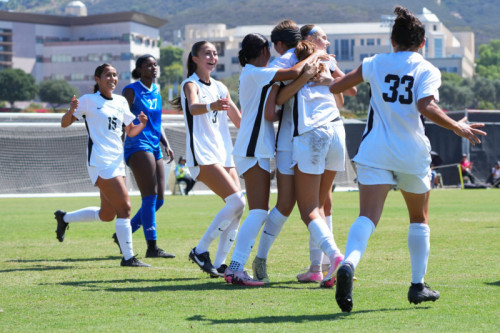 Women's Soccer Team Finishes Nonconference Play With WinDanielle Paulson's goal in the 78th minute was the difference as the Cal State San Marcos women's soccer team beat visiting Cal State San Bernardino 1-0 in its final nonconference game of the season Sunday. Paulson scored on an assist from her sister, Natalie Paulson. The Cougars, who finished nonconference play with a 3-1-2 record, open the California Collegiate Athletic Association portion of their schedule on Friday at Cal Poly Humboldt. Media Contact Eric Breier, Interim Assistant Director of Editorial and External Affairs ebreier@csusm.edu | Office: 760-750-7314
Women's Soccer Team Finishes Nonconference Play With WinDanielle Paulson's goal in the 78th minute was the difference as the Cal State San Marcos women's soccer team beat visiting Cal State San Bernardino 1-0 in its final nonconference game of the season Sunday. Paulson scored on an assist from her sister, Natalie Paulson. The Cougars, who finished nonconference play with a 3-1-2 record, open the California Collegiate Athletic Association portion of their schedule on Friday at Cal Poly Humboldt. Media Contact Eric Breier, Interim Assistant Director of Editorial and External Affairs ebreier@csusm.edu | Office: 760-750-7314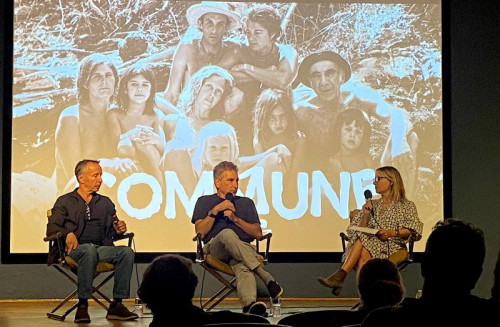 Professor Goes on Tour for 20th Anniversary of Acclaimed FilmWhen Jonathan Berman came to Cal State San Marcos as a film professor in 2004, he was close to finishing a documentary about a Northern California commune during the counterculture era. The documentary was released the following year. Now, 20 years later, Berman is marking the anniversary of the film with a new digital restoration and a national tour of screenings and interviews. “Commune” is about an intentional community called Black Bear Ranch formed in 1968 in remote Siskiyou County just south of the Oregon border. A dozen people were expected to live there, but the number eventually swelled to 100 in what was a utopian experiment that attracted anarchists, hippies and activists seeking to get away from America and create something new. The documentary includes prominent actor Peter Coyote, who once lived at Black Bear. At the time of its release, “Commune” received positive reviews from such outlets as the New York Times, Variety, the Village Voice and the San Francisco Chronicle. It boasts a rating of 96% on Rotten Tomatoes. Berman says he decided to restore the film so that it would be suitable to appear on streaming services and that he chose to embark on a nationwide tour to give fans “the communal experience of theatrical.” The tour began in May in upstate New York and will end this month back in New York. In September, it made four stops in California, including Los Angeles and the Bay Area town of San Rafael, where some former Black Bear denizens reside. “Twenty years later, it is a warm feeling to reunite with those folks,” Berman said. “They have almost all gone on to do work that helps people; some of this can be gleaned in the film. It was almost like reuniting with relatives after a long time. I felt a little guilty for not really being in touch more, but then happy to see them again.” In addition to the 16 theaters that have screened “Commune,” Berman has been interviewed on nearly 20 podcasts. He’s hoping to add a few more showings in Southern California, including at least one in the San Diego area. After making “Commune,” Berman focused on teaching and consulting on other films before the release in 2018 of “Calling All Earthlings,” which examines California’s UFO counterculture cult and the Integratron, a mysterious structure in the desert north of Joshua Tree National Park. He’s now working on the third documentary in what he calls his California trilogy; titled “Gondola,” it’s about the controversial plan to build an aerial tram from Union Station to Dodger Stadium in L.A. Berman says his film work over the years has benefited greatly from the contributions of CSUSM students and fellow faculty members, from serving internships to watching and giving feedback on test edits. “That’s part of our mission as a university, for students to work intimately with teachers who are active in their field,” he said. Media Contact Brian Hiro, Communications Specialist bhiro@csusm.edu | Office: 760-750-7306
Professor Goes on Tour for 20th Anniversary of Acclaimed FilmWhen Jonathan Berman came to Cal State San Marcos as a film professor in 2004, he was close to finishing a documentary about a Northern California commune during the counterculture era. The documentary was released the following year. Now, 20 years later, Berman is marking the anniversary of the film with a new digital restoration and a national tour of screenings and interviews. “Commune” is about an intentional community called Black Bear Ranch formed in 1968 in remote Siskiyou County just south of the Oregon border. A dozen people were expected to live there, but the number eventually swelled to 100 in what was a utopian experiment that attracted anarchists, hippies and activists seeking to get away from America and create something new. The documentary includes prominent actor Peter Coyote, who once lived at Black Bear. At the time of its release, “Commune” received positive reviews from such outlets as the New York Times, Variety, the Village Voice and the San Francisco Chronicle. It boasts a rating of 96% on Rotten Tomatoes. Berman says he decided to restore the film so that it would be suitable to appear on streaming services and that he chose to embark on a nationwide tour to give fans “the communal experience of theatrical.” The tour began in May in upstate New York and will end this month back in New York. In September, it made four stops in California, including Los Angeles and the Bay Area town of San Rafael, where some former Black Bear denizens reside. “Twenty years later, it is a warm feeling to reunite with those folks,” Berman said. “They have almost all gone on to do work that helps people; some of this can be gleaned in the film. It was almost like reuniting with relatives after a long time. I felt a little guilty for not really being in touch more, but then happy to see them again.” In addition to the 16 theaters that have screened “Commune,” Berman has been interviewed on nearly 20 podcasts. He’s hoping to add a few more showings in Southern California, including at least one in the San Diego area. After making “Commune,” Berman focused on teaching and consulting on other films before the release in 2018 of “Calling All Earthlings,” which examines California’s UFO counterculture cult and the Integratron, a mysterious structure in the desert north of Joshua Tree National Park. He’s now working on the third documentary in what he calls his California trilogy; titled “Gondola,” it’s about the controversial plan to build an aerial tram from Union Station to Dodger Stadium in L.A. Berman says his film work over the years has benefited greatly from the contributions of CSUSM students and fellow faculty members, from serving internships to watching and giving feedback on test edits. “That’s part of our mission as a university, for students to work intimately with teachers who are active in their field,” he said. Media Contact Brian Hiro, Communications Specialist bhiro@csusm.edu | Office: 760-750-7306
- Women's Soccer Team Finishes Nonconference Play With WinDanielle Paulson's goal in the 78th minute was the difference as the Cal State San Marcos women's soccer team beat visiting Cal State San Bernardino 1-0 in its final nonconference game of the season Sunday. Paulson scored on an assist from her sister, Natalie Paulson. The Cougars, who finished nonconference play with a 3-1-2 record, open the California Collegiate Athletic Association portion of their schedule on Friday at Cal Poly Humboldt. Media Contact Eric Breier, Interim Assistant Director of Editorial and External Affairs ebreier@csusm.edu | Office: 760-750-7314

- Professor Goes on Tour for 20th Anniversary of Acclaimed FilmWhen Jonathan Berman came to Cal State San Marcos as a film professor in 2004, he was close to finishing a documentary about a Northern California commune during the counterculture era. The documentary was released the following year. Now, 20 years later, Berman is marking the anniversary of the film with a new digital restoration and a national tour of screenings and interviews. “Commune” is about an intentional community called Black Bear Ranch formed in 1968 in remote Siskiyou County just south of the Oregon border. A dozen people were expected to live there, but the number eventually swelled to 100 in what was a utopian experiment that attracted anarchists, hippies and activists seeking to get away from America and create something new. The documentary includes prominent actor Peter Coyote, who once lived at Black Bear. At the time of its release, “Commune” received positive reviews from such outlets as the New York Times, Variety, the Village Voice and the San Francisco Chronicle. It boasts a rating of 96% on Rotten Tomatoes. Berman says he decided to restore the film so that it would be suitable to appear on streaming services and that he chose to embark on a nationwide tour to give fans “the communal experience of theatrical.” The tour began in May in upstate New York and will end this month back in New York. In September, it made four stops in California, including Los Angeles and the Bay Area town of San Rafael, where some former Black Bear denizens reside. “Twenty years later, it is a warm feeling to reunite with those folks,” Berman said. “They have almost all gone on to do work that helps people; some of this can be gleaned in the film. It was almost like reuniting with relatives after a long time. I felt a little guilty for not really being in touch more, but then happy to see them again.” In addition to the 16 theaters that have screened “Commune,” Berman has been interviewed on nearly 20 podcasts. He’s hoping to add a few more showings in Southern California, including at least one in the San Diego area. After making “Commune,” Berman focused on teaching and consulting on other films before the release in 2018 of “Calling All Earthlings,” which examines California’s UFO counterculture cult and the Integratron, a mysterious structure in the desert north of Joshua Tree National Park. He’s now working on the third documentary in what he calls his California trilogy; titled “Gondola,” it’s about the controversial plan to build an aerial tram from Union Station to Dodger Stadium in L.A. Berman says his film work over the years has benefited greatly from the contributions of CSUSM students and fellow faculty members, from serving internships to watching and giving feedback on test edits. “That’s part of our mission as a university, for students to work intimately with teachers who are active in their field,” he said. Media Contact Brian Hiro, Communications Specialist bhiro@csusm.edu | Office: 760-750-7306

- 'It's Irreplaceable': Giant Oak Tree Saved in RelocationA giant oak tree as old as Cal State San Marcos itself was saved this month as part of a large-scale relocation project. The tree, which was planted around the time of CSUSM’s founding in 1989 and weighs 27 tons, was moved in early September from a plot outside the Arts Building to the area between Kellogg Library and Campus View Drive, near the main circle. “It’s not every day that you move a tree that size,” said Michelle Alves, a campus planner in Planning, Design and Construction (PDC) who helped supervise the project. The fate of the tree was thrown into question over the summer when Facilities Development and Management (FDM) began the construction of a new glass elevator on the perimeter of the Arts Building. Because the tree sat right next to the construction zone, the determination was that it would need to be uprooted to give it the best chance of survival. “That kind of oak tree, you could never buy one. It’s irreplaceable,” Alves said. The relocation occurred on Sept. 6 – a Saturday, to take advantage of minimal car and foot traffic on campus. Alves arrived at 5 a.m., planning to be on site for six hours; it turned out to be more than nine. In all, the project involved about 20 workers, including several from FDM and several more from an Escondido company called Big Trees Nursery. After landscapers boxed and harnessed the tree, a crane lifted it out of the ground and laid it on its side on a flatbed truck (a smaller truck after the first one proved too big to navigate the service road, causing an hour delay). On the drive northeast out of campus, the oak’s branches were so wide that they were brushing the overhang of the Arts Building and the trees outside Science Hall 2. “It looked like it was high-fiving other trees all the way down, like it was saying, ‘See you later,’ ” Alves joked. At a very deliberate, almost walking pace, the truck descended the service road to La Moree Road, re-entered campus near the Sprinter station and drove southwest on Campus View Drive to the tree’s new resting spot behind the library. Along the way, the precious cargo had a front and back escort from University Police Department vehicles. Now situated on the ground next to the main circle, the crane lifted the tree from the truck and deposited it in a pre-dug hole. Workers attached three braces to the trunk to provide support in case of wind or rain. The tree, which is about 40 feet tall and 30 feet wide, will be given vitamins and extra water in the coming weeks. “We’re setting it up for success and a long, happy life,” said Alves, adding that oak trees can live up to 300 years, making this one a relative baby. Alves said the project reflects CSUSM’s dedication to sustainability and its achievement last year of Level 1 arboretum accreditation and Tree Campus USA recognition. She also spotlighted the efforts of the university’s landscaping team, namely Raul Vaca and Ricardo Jacobo, with after-care by Isidro (Sid) Alvarez. “It was a team effort, and it took a team to pull it off,” she said. “Often, FDM is behind the scenes, like we’re the engine running the campus. But I want people to know that we do some really cool stuff.” Media Contact Brian Hiro, Communications Specialist bhiro@csusm.edu | Office: 760-750-7306
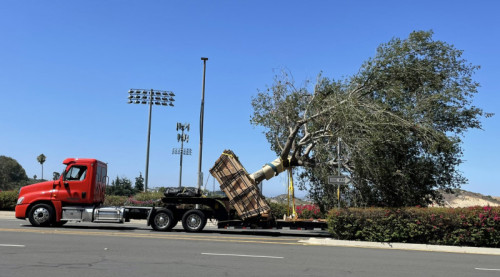
- Alumna Comes Full Circle in Return to School of EducationCassiopeia Guthrie has worn many hats in her career – educator, journalist, curriculum designer and arts advocate. But at the heart of it all is a deep commitment to equity, creativity and student success. A proud alumna of Cal State San Marcos and its School of Education, Guthrie serves as a Distinguished Teacher in Residence (DTiR) – a unique program that brings experienced educators into the university to teach, mentor and lead. DTiRs play a vital role in preparing the next generation of teachers by bridging theory and practice, offering students real-world insights and guidance rooted in classroom experience. In her role, Guthrie designs and teaches a wide range of undergraduate, credential and graduate-level courses. Her leadership extends beyond instruction, as she co-chairs the school’s Community Governance and DTiR committees and serves on the Education Recruitment Committee. “It has been an honor to come full circle by returning to teach in the School of Education," Guthrie said. “The faculty at CSUSM do an incredible job of preparing and inspiring future educators to create meaningful learning environments across our region. The opportunity to bring my classroom and real-world experience back to support our TK–12 candidates fills me with both joy and a deep sense of purpose.” Last year, Guthrie was honored with the College of Education, Health and Human Services Outstanding Alumni Award, a recognition of her impact on education and her continued dedication to CSUSM’s mission. Now, she’s taking on a new challenge as the faculty fellow for Project R.I.S.E. (Recruiting Inclusive, Supportive Educators), leading strategic programming and planning to support sustained outreach across partner school districts. Her work will lay the foundation for a future Project R.I.S.E. Center, envisioned as a regional hub to strengthen recruitment and pipeline development for aspiring educators. “Cassiopeia brings a unique blend of creativity, strategic thinking and heart to everything she does,” said Moses Ochanji, director of the School of Education. “Her leadership in Project R.I.S.E. will help us build lasting partnerships and expand opportunities for future teachers.” Guthrie’s journey began with a bachelor’s degree in journalism from San Diego State, followed by a teaching credential at CSUSM and an MBA from a private university. She is pursuing a Doctor of Education in Educational Leadership through the joint doctoral program between CSUSM and UC San Diego, with a research focus on how political rhetoric affects teachers’ emotional responses in polarized times. Her resume includes roles such as a curriculum and educational technology specialist, marketing communications officer, and arts integration fellow with CSUSM’s Center ARTES. She also has served as a journalist and theater critic, earning multiple San Diego Press Club awards and contributing to outlets such as San Diego Magazine and San Diego Story. Whether she’s leading professional development, designing equity-focused curriculum or mentoring future educators, Guthrie’s work reflects CSUSM’s commitment to innovation and developing creative solutions in partnership with the community. Support leaders like Cassiopeia Guthrie and programs like DTiR, Project R.I.S.E. and Center ARTES by contributing to CSUSM’s “Blueprint for the Future” fundraising campaign. Your gift helps us innovate in education, accelerate student success and cultivate lasting impact across our region. Learn more and give today. Media Contact Brian Hiro, Communications Specialist bhiro@csusm.edu | Office: 760-750-7306
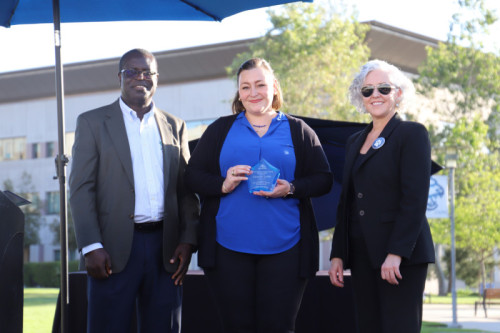
- $2 Million Grant to Benefit Chemistry and Biochemistry StudentsThe STEM field is a continuously growing community with many job opportunities available for science students. Cal State San Marcos is committed to providing the resources and support these students need to pursue higher education and integrate themselves into the workforce. That commitment received a boost recently, as CSUSM was awarded a $2 million grant from the National Science Foundation to create a learning community for chemistry and biochemistry majors and award scholarships to qualified students. The program will incorporate a Vertical Mentoring Learning Community (VMLC) for up to 30 chemistry and biochemistry students each year, with eight first-year students receiving a renewable $15,000 scholarship based on financial need. The program is led by chemistry and biochemistry professor Robert Iafe, the principal investigator, and co-principal investigators Afra Panahi, a chemistry and biochemistry professor, and Aswad Allen, CSUSM’s chief diversity officer. Together, they plan to create a community of high-achieving, motivated students recruited from introductory chemistry classes. Students who prove proficient and committed to their studies will be invited to join the learning community, and those who qualify financially will be able to apply for the additional scholarship to help with tuition and housing. “The community aspect of it gives it a supportive place to really go for your goals, but also a safe and secure place to experiment,” Iafe said. Students selected for the VMLC also will receive priority enrollment for chemistry classes and labs required for their major. The vertical mentoring learning experience highlights a discipline-specific learning community of students supported by each other, faculty members and professionals. This offers students a comfortable learning environment filled with like-minded individuals guiding them toward their futures in STEM, whether that be graduate school or pursuing a career. “We make sure they participate in professional development activities so they can build a strong science identity and become more competitive for graduate school and the job market,” Panahi said. “The supportive environment from their peer mentors, academic advisers and professional mentors can really help them build a stronger network.” The smaller, more intimate setting of the vertical mentoring program provides a comfortable space for students to ask questions freely and create a closer relationship with faculty. This environment creates a rewarding experience for all and promotes a sense of happiness and job satisfaction among the faculty involved. “There are concrete benchmarks along the way for students to actually see themselves progressing,” Allen said. "Vertical learning allows students to visualize their futures and see themselves where they want to be. “We're going to create the right atmosphere, the right environment and all the right ingredients for them to thrive.” Learn more on the Vertical Mentoring Learning Community website. Media Contact Eric Breier, Interim Assistant Director of Editorial and External Affairs ebreier@csusm.edu | Office: 760-750-7314
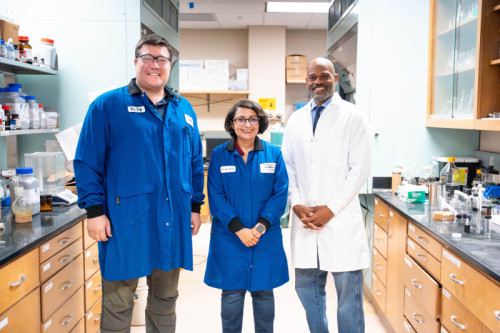
- New Library Exhibit Explores World of ZinesIt’s fitting that the title of the new art exhibit on the third floor of Kellogg Library is “Zine Dreams.” April Ibarra Siqueiros, the curator of the exhibit and a user experience librarian at Cal State San Marcos, does indeed dream of zines – short for “magazine,” the term refers to handmade publications in booklet form about any topic, presented as an alternative to mainstream media. Siqueiros dreams about the zines she wants to make. She dreams about the zines she wants to add to her growing collection. And she dreams about the zine community that she wants to cultivate at CSUSM. Her current exhibit in the library – part of the biannual Context Exhibit Series, it’s on display in person or online through Dec. 15 – is a big step in that direction. Subtitled “publishing in your hands,” the exhibit is essentially a love letter to zine culture told through Siqueiros’ creative eye and curious mind. It features about 60 zines from her personal collection – covering such topics as borders, immigration, art, gender and sexuality – and a dozen more that she has made, either by herself or with a group. It also includes information about the process of zine-making, the history of zines and the local zine community. “Zines can be a way for marginalized and oppressed voices to use a format to share their stories, make calls to action, teach something and build community,” Siqueiros said. “They can also be random, silly and made to bring joy. It's a format that is open to all, regardless of skill level. “Sometimes I hear someone say they aren't an artist or ‘creative’ when it comes to zine making, but in my experience teaching zine workshops, that doesn't matter. If someone intentionally explores zine making, it is likely a cool zine will come out of it.” Growing up in the South Bay, Siqueiros says she was always a crafty child. She remembers first hearing about zines from a Nickelodeon cartoon in the early 2000s, and she bought her first one in 2008 – a Mexican cookzine called “Vegan de Guadalupe” (a play on veganism and the Virgin Mary), it’s included in the exhibit. Siqueiros crossed over from simply collecting zines to making them about a decade ago when she was pursuing a master’s degree in library and information science at the Pratt Institute in New York. Inspired by attending the Brooklyn Zine Fest, she created her initial zine as part of an art collective with some friends. A year later, she displayed her first solo zine at the same festival. “Having been an artist and crafter, I’ve always gravitated to making things,” she said. “Zines opened up another realm of creating for me, which stuck 10 years later.” Most of zines Siqueiros has made fall under the general theme she conjured up called “Valley of Paradox.” Of those, she’s proudest of one named “Celestial Hearts: deep connections with deep space,” which is about her love of astronomy. It represented a leap forward for her in ambition, creativity and research, and about half of it is contributed content from fellow zinesters who responded to a call for submission. She’s working on a second and third part of the series, which will focus alternately on her personal astronomical adventures and stories, and research about astronomers and space explorers. Siqueiros has worked for the CSUSM library since 2019, and during that time she gradually has become exposed to an interest in zines by the campus community – whether it’s professors incorporating zines into their assignments or colleagues who make them or are just intrigued by them. She began thinking about curating the exhibit two years ago, and her desire to pursue it was reinforced as she taught zine workshops for a few instructors, including Dominque Harrison, who works for the Office of Institutional Planning & Analysis but also teaches a seminar for first-year students. Three zines created during Harrison’s class last summer are on display in the exhibit. “While zines are not mainstream, it just takes a zine point person to open up this format to someone’s world,” Siqueiros said. She would like to be that person for any number of students who stroll by her exhibit this semester. But she doesn’t want “Zine Dreams” to be only a passive experience. The goal is to unlock others’ zine-making potential. On Oct. 9 from 1-2 p.m., Siqueiros will collaborate with the Common Read program on a workshop in The Makery where students can create a page in a collective zine that highlights their identities and stories. “It might take someone years later to make one like it did for me,” she said. “Minimally, my hope is that anyone who sees the exhibit reflects on the power of DIY publishing and how zines provide a way for us to learn about things that we may never be exposed to otherwise.” Media Contact Brian Hiro, Communications Specialist bhiro@csusm.edu | Office: 760-750-7306
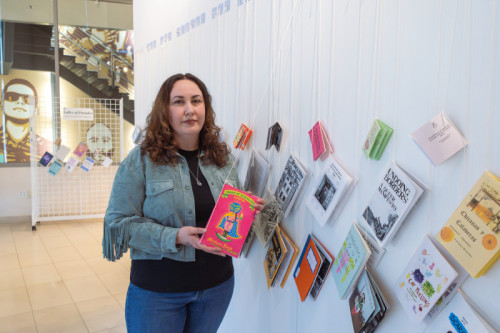
- CSUSM Kicks Off Historic $200 Million Fundraising CampaignAs one of the nation’s top universities for advancing social mobility, Cal State San Marcos has transformed lives and strengthened communities for more than three decades. Now, through the largest fundraising campaign in university history, CSUSM aims to raise $200 million to support student success and power the region’s future. CSUSM officially launched its “Blueprint for the Future” campaign on Sept. 19. It’s an effort that combines philanthropy with grants and research funding. The campaign’s theme reflects both the physical growth on campus and the forward momentum building at CSUSM. To underscore this momentum, CSUSM President Ellen Neufeldt launched the campaign with the announcement of a transformational $10 million philanthropic investment from Hunter Industries to support the construction of CSUSM’s new Integrated Science and Engineering (ISE) Building. This ranks among the largest philanthropic gifts in CSUSM’s history – joining landmark contributions from Price Philanthropies and the Epstein Family Foundation at the same level. “The ‘Blueprint for the Future’ campaign is our commitment to reimagining what’s possible in higher education,” Neufeldt said. “We are a university that is different by design, which means we are truly intentional about how we meet our mission of student success. This campaign is more than a call to give – it’s a call to transform lives, uplift families and power the future of our region.” Building on a strong foundation of student success, career readiness and community impact, “Blueprint for the Future” is guided by three pillars: Innovate – driving bold ideas and solutions that expand opportunity. Accelerate – advancing student success and creating lasting impact. Cultivate – strengthening community connections and pathways from education into careers. “What excites me most about CSUSM is how innovation here directly translates into workforce opportunity,” said Simon Kuo, chair of the CSUSM Foundation Board and vice president of corporate quality at Viasat. “The ‘Blueprint for the Future’ campaign is about fueling new ideas and building the pipeline of talent our region needs to thrive – from health care and technology to education and the arts.” With more than 70% of the goal raised at the time of the public launch in September, “Blueprint for the Future” is off to a strong start. Thanks to philanthropic gifts and research funding, CSUSM has been able to: Launch the Scholars in Wellness and Innovation Fast-Track (SWIFT) Health Programs, a unique accelerated three-year degree with dual enrollment starting in high school. Break ground on the new ISE Building, expanding STEM programs and increasing enrollment capacity. Significantly grow the endowment to support the work of the California Indian Culture and Sovereignty Center (CICSC). Advance research in areas such as quantum information science and technology, further develop undergraduate STEM education and expand workforce development through the Veterans to Naval Careers program. Strengthen the work of the CSU Shiley Haynes Institute for Palliative Care by expanding to other CSU campuses. Discover how you can be part of CSUSM’s historic “Blueprint for the Future” campaign. Media Contact Eric Breier, Interim Assistant Director of Editorial and External Affairs ebreier@csusm.edu | Office: 760-750-7314
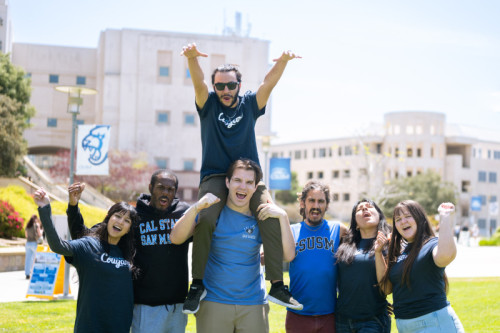
- Grant Helps Empower Future Mental Health LeadersAnahi Martinez Mendez has known since she was a teenager that she wanted to pursue a career helping children with mental health challenges. Martinez Mendez contended with social anxiety herself as a teen, and she was eager to ensure that her younger siblings knew there were resources and support systems to help if they faced similar challenges. “I was like their second mother, especially with my sister,” Martinez Mendez said. “It made me think, ‘How can I implement and help with mental health and related issues?’ Because growing up, I never really had the support system.” Martinez Mendez arrived at Cal State San Marcos initially planning to major in psychology and work toward becoming a clinical psychologist or family therapist. But working at Student Health & Counseling Services (SHCS) inspired her to pursue a slightly different path. Martinez Mendez spent two years during her undergraduate studies working in CSUSM’s HOPE & Wellness Center as a peer educator. The experience was life-changing, inspiring Martinez Mendez to pursue a Master of Social Work (MSW) degree at CSUSM after she graduated last May as a double major in child and adolescent development and Spanish. “I realized that I love doing more community outreach than working one on one,” she said. The HOPE & Wellness Center is among several groups on campus devoted to providing mental health services for CSUSM students. Last year, the university received a $250,000 grant from the Conrad Prebys Foundation to advance those services, part of a larger $6 million investment by the Prebys Foundation in grants to 23 local organizations. The Prebys Foundation’s funding helped CSUSM launch a mental health intervention program called the Community of Care that brings together the Cougar Care Network, SHCS and the Crisis Response Team. The grant also served as a catalyst for additional philanthropic support, including funding from the San Diego Foundation’s mental health program for MSW interns and a matching contribution from the Epstein Family Foundation. The Community of Care’s efforts to decrease mental health challenges and crises for students include the following strategies: Providing counseling through SHCS for students seeking mental health support. Providing basic needs resources and expanding mental health referral support through Cougar Care Network and its mobile Care Cart. Providing response to time-sensitive mental health crises on campus. Martinez Mendez is part of those efforts as a MSW graduate assistant this year for the HOPE & Wellness Center. She works closely with Cathy Nguyen, the coordinator of health promotion and a senior health educator, and Rosa Hunt, a health educator. Martinez Mendez became more interested in social work through her undergraduate work with psychology professor Aleksandria Grabow. It was Grabow who taught her about the many different areas that social work touches. A self-described introvert, Martinez Mendez also credits psychology professor Kimberly Vanderbilt for helping her grow and become more comfortable working with families. As a MSW student, Martinez Mendez attends classes two days a week while working 20 hours a week at schools in San Marcos Unified School District to earn her pupil personnel services credential, which authorizes individuals to work as school counselors, school psychologists or school social workers. It’s all part of her goal of becoming a school social worker or therapist to continue advocating for mental health for school-aged children. Visit the Student Health & Counseling Services website to learn about free mental health first aid trainings. SHCS will host the “Suicide Awareness Walk and Candlelight Vigil” on Sept. 25 at 5 p.m. Learn more about other upcoming events to support mental health on the SHCS events calendar. Media Contact Eric Breier, Interim Assistant Director of Editorial and External Affairs ebreier@csusm.edu | Office: 760-750-7314
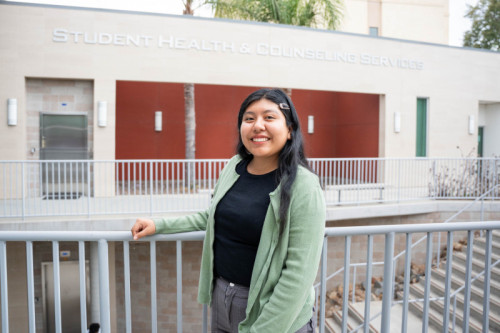
Loading...


